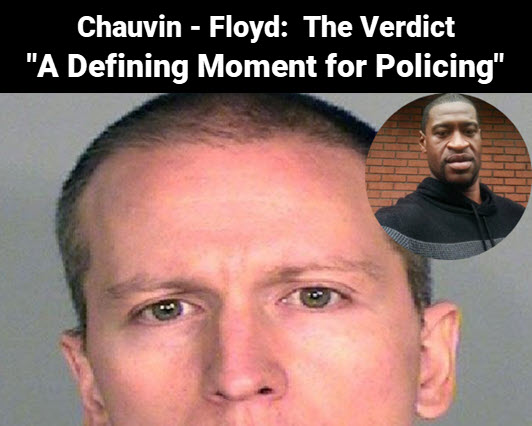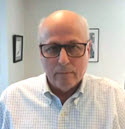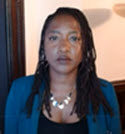Chauvin-Floyd: "A Defining Moment for Policing" – "What We Need Is Transformation"
Posted April 21, 2021 06:15 am | Op-Ed

Chauvin-Floyd image: the Jasmine BRAND |
Observer graphic
Judy Woodruff: We take a broader look at this moment with Chuck Wexler, the executive director of the Police Executive Research Forum, a Washington, D.C.-based think tank, and Janai Nelson, the associate director counsel of the NAACP Legal Defense and Education Fund.
Chuck Wexler, someone who has studied the police, has seen time and again police found not guilty in cases like this, in cases where someone died. How are you reacting right now?
 Chuck
Wexler: This case was a defining
moment for policing.
Chuck
Wexler: This case was a defining
moment for policing.
This was so egregious, that the use of force here was so clear and so clear-cut, that, for the last 11 months — first of all, the condolences go to the Floyd family, number one.
But for every working cop that saw that video over and over again, nine minutes, they thought to themselves, why — what was that cop thinking? And that's taken a toll on the country. It's taken a toll on the Minneapolis community and communities all across the country.
I think there is not a police chief, a cop I know of that didn't want this police officer found guilty. It was so egregious and so bad in so many ways. But I think this is a turning point, because I think what you saw in Minneapolis in the trial is, you saw the police chief, you saw the most senior homicide person, you saw all of the cops on the same side of justice.
I think that was a turning point.
Judy Woodruff: Janai Nelson, the NAACP, that works for — toward equality for all Americans, how are you seeing this verdict?
 Janai
Nelson: I'm seeing this
verdict as a real inflection point. It is a
floor. It is, sadly, something that we could
not count on.
Janai
Nelson: I'm seeing this
verdict as a real inflection point. It is a
floor. It is, sadly, something that we could
not count on.
This conviction was well-deserved. It is something that should have been beyond any doubt. And yet, many of us were bracing ourselves for an alternative that could have been incredibly devastating, not only for the family of George Floyd, to whom I extend the Legal Defense Fund's most sincere condolences, but also for the greater community that is working so hard to peacefully bring change and transition and transformation to the way that we conduct the public safety apparatus in our country.
Right now, it is woefully broken. It is clear that, even with a conviction like the one we saw today, that is not a panacea. It is not a solve for the murders and killings and other forms of violence that continue to be visited upon Black and brown communities, as we saw in the Daunte Wright case, as we saw in Adam Toledo's case, and the many others that preceded it, including Breonna Taylor's from last year, that also drove people to the streets.
Judy Woodruff: Chuck Wexler, will policing change after this?
Chuck Wexler: I think it's going to take a lot of work.
I know people are motivated to change. This is a defining moment, this entire year, all the cases that we have talked about. But we need to really be tough. And we need to be tough on ourselves. We need to be prepared to look at these videos and say, what could we do differently?
I worry about, who are going to want to be the cops of the future? This is a difficult job. When you're in crisis, there is nothing better than a good cop and there's nothing worse than a bad cop.
We have our work cut out for us. Today was a defining moment. Justice prevailed. But I think we have got our work cut out for us in developing cops of the future.
Judy Woodruff: Janai Nelson, from your perspective, how do you see the work that lies ahead? What are the next steps that need to come after this verdict?
Janai Nelson: We need to work on two tracks.
We need to continue to work on police accountability, because police are not going away tomorrow. They are with us for the near future.
We need to make sure that, while they are continuing to work in our communities, that they are treating everyone fairly, that they are not engaging in wanton violence, and that they are held accountable.
We don't want accountability after the fact, when there have been violent episodes and the loss of life. What we want is a new system of public safety that doesn't disproportionately deny dignity and humanity to Black and brown communities. That is a radically different vision of the policing system that we have now and the system of public safety that we have submitted to.
That must change if we want to ensure that there are no more George Floyds. If we want to ensure that young people are given the benefit of the doubt when they are engaged in an encounter with the police, if we want to ensure a future in this country where there can be a modicum of safety that every person can rely upon, and constitutional, civil and human rights that will be protected fundamentally, then we need to think of something very different from the current policing system and system of public safety that we have.
We need to work on two tracks to do that.
We can start by passing the George Floyd Justice in Policing Act. That would be another step on the road to justice for George Floyd to actually have legislation in his name that improves policing and public safety in this country.
Judy Woodruff: A piece of legislation that, of course, has passed the House of Representatives and is now before the Senate.
Chuck Wexler, is the kind of policing that Janai Nelson is describing, is that feasible? Is that possible in this country now?
Chuck Wexler: Well, I think we have to work together.
I think, right now, we have divided communities. I think we have to take responsibility. Look at demonstrations. Why do police own those demonstrations? They should be working with the community. We should be engaged with them. That's the future.
The future isn't necessarily just legislation. The future is thinking differently about the police. The future is thinking, how do we prevent what happened in Minneapolis? How do we select the best and the brightest? How do we change training?
Our training in this country hasn't changed in 25 years. But I'm optimistic.
Police want to do a good job. We need good police. But we do need to fundamentally change. It's hard. It's going to take work. But I'm optimistic, if we recognize we can't lose this moment.
We can't move on to the next video and get preoccupied.
I talk to police chiefs, sheriffs all the time. They are devastated by this case. But that's not who they are. That's not who they want to be. But I think, in terms of the future, we have to think differently, no question about it.
Judy Woodruff: Janai Nelson, do you — is it your sense that this kind of working together can happen?
Janai Nelson: I certainly think there are many opportunities that are immediate, in which police officers, law enforcement agencies can step up and stand up for better protection of communities and against those officers and those systems of policing that render communities of color the victims of police violence all too often.
That does not, though, supplant the absolute need for a transformed system of public safety. The one that we have right now is so deeply infected with systemic racism, has historical roots in the subjugation of Black people, and continues to operate in a way that systematically terrorizes our communities. That is something that will be very difficult to reform.
What we need is transformation. And I do think that this is a moment where we can all try to work collectively toward that transformation of public safety.
---------------------------
 Judy
Carline Woodruff is a
U.S. broadcast journalist who has worked in
network, cable, and public television
news since 1976. She is the anchor and
managing editor of PBS NewsHour. Woodruff
has covered every presidential election and
convention since 1976. She has interviewed
several heads of state and moderated U.S.
presidential debates.
Judy
Carline Woodruff is a
U.S. broadcast journalist who has worked in
network, cable, and public television
news since 1976. She is the anchor and
managing editor of PBS NewsHour. Woodruff
has covered every presidential election and
convention since 1976. She has interviewed
several heads of state and moderated U.S.
presidential debates.

